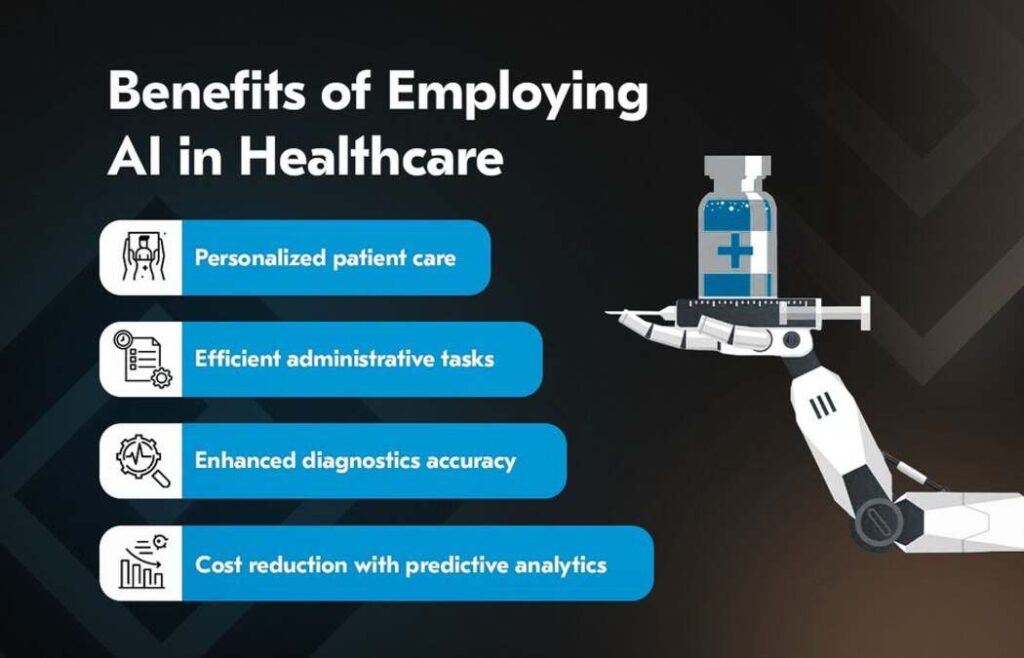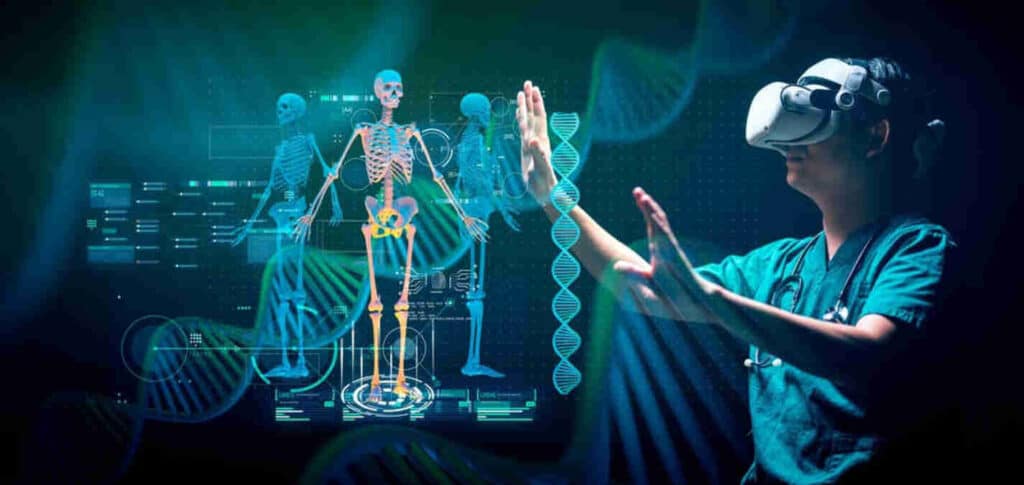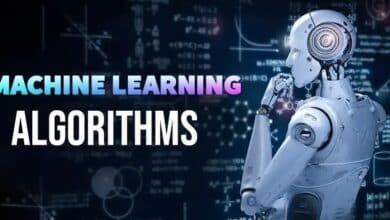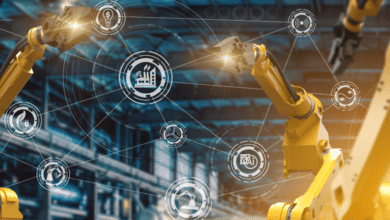Artificial Intelligence (AI) in Healthcare: Best Medicine in the Future

Artificial Intelligence (AI) is no longer just a concept of the future; it is a transformative technology that is actively shaping industries across the globe. Among the sectors most profoundly impacted by AI is healthcare, where the technology is leading to groundbreaking changes in the way diseases are diagnosed, treated, and managed. In this article, we explore the expansive role of AI in healthcare, its applications, benefits, challenges, and the future it promises.
AI in Medical Diagnosis: Enhancing Accuracy and Speed
One of the most promising applications of AI in healthcare is in the realm of medical diagnosis. AI algorithms, particularly those powered by machine learning (ML) and deep learning, are capable of analyzing vast amounts of data far more quickly and accurately than human clinicians. These algorithms can identify patterns in medical images, genetic information, and patient histories that might be missed by even the most experienced doctors.
AI in Radiology and Imaging

The application of AI has significantly advanced radiology. AI-powered tools can analyze medical images such as X-rays, CT scans, and MRIs, detecting anomalies with remarkable precision. For instance, AI systems have been developed to detect early signs of diseases like cancer, often spotting tumors that are imperceptible to the human eye. This early detection is critical, as it can significantly improve patient outcomes by allowing for earlier intervention.
Predictive Analytics in Disease Outbreaks
AI is also being used to predict disease outbreaks by analyzing data from various sources, including social media, news reports, and health records. By identifying trends and patterns, AI in healthcare systems can predict potential outbreaks and provide early warnings, enabling healthcare providers and governments to take preventive measures. This predictive capability was notably demonstrated during the COVID-19 pandemic, where AI systems were instrumental in tracking and predicting the virus’s spread.
AI in Personalized Medicine: Tailoring Treatments to Individual Patients
Personalized medicine, also known as precision medicine, is another area where AI is making significant strides. This approach involves tailoring medical treatments to individual patients based on their unique genetic makeup, lifestyle, and environmental factors.
Genomics and AI
AI is revolutionizing the field of genomics by accelerating the analysis of genetic data. Traditionally, sequencing and interpreting a patient’s genome was a time-consuming and expensive process. However, AI-driven platforms can now analyze genetic data rapidly, identifying mutations and genetic markers that could indicate a predisposition to certain diseases. This information allows healthcare providers to develop customized treatment plans that are far more effective than traditional one-size-fits-all approaches.
Drug Development and AI
AI is also very important for the creation and discovery of new drugs. The process of developing new drugs is notoriously lengthy and expensive, often taking years and billions of dollars to bring a single drug to market. AI in healthcare is helping to streamline this process by predicting how different compounds will interact with biological targets, identifying potential side effects, and even suggesting new drug candidates. This not only speeds up the development process but also reduces the costs associated with bringing new drugs to market.
AI in Healthcare Administration: Improving Efficiency and Reducing Costs

AI has a profound impact on healthcare administration in addition to direct patient treatment. From scheduling and billing to supply chain management, AI systems are helping healthcare organizations run more efficiently, reduce costs, and improve patient satisfaction.
AI in Scheduling and Resource Management
AI-driven tools are being used to optimize scheduling, ensuring that healthcare providers are not overbooked or underutilized. These tools can analyze patterns in patient appointments and predict no-shows, allowing healthcare facilities to adjust schedules accordingly. This optimization not only improves the efficiency of healthcare providers but also reduces patient wait times and enhances the overall patient experience.
Fraud Detection and AI
Healthcare fraud is a significant issue, costing the industry billions of dollars each year. AI in healthcare systems are being employed to detect fraudulent activities by analyzing vast amounts of data and identifying unusual patterns that may indicate fraud. These systems can flag suspicious claims, reducing the time and resources spent on manual audits and investigations.
Challenges and Ethical Considerations in AI-Driven Healthcare
AI has enormous potential benefits for the healthcare industry, but there are also important obstacles and moral dilemmas that need to be resolved.
Data Privacy and Security
Data security and privacy are among the most urgent issues. AI systems rely on vast amounts of data to function effectively, and much of this data is highly sensitive medical information. Ensuring that this data is protected from breaches and unauthorized access is paramount. Additionally, there are concerns about how this data is used and whether patients have adequate control over their information.
Bias in AI Algorithms
Another major worry is the potential for bias in AI algorithms. If the data used to train AI systems is biased, the resulting algorithms may also be biased, leading to disparities in healthcare outcomes. For example, an AI in healthcare system trained on data from predominantly white populations may not perform as well when applied to patients from other ethnic groups. Addressing this issue requires careful consideration of the data used in AI training and ongoing monitoring of AI systems to ensure they provide equitable care.
Regulation and Oversight
As AI becomes more integrated into healthcare, there is a growing need for regulation and oversight to ensure that these technologies are used safely and effectively. Governments and regulatory bodies must work to develop guidelines and standards for AI in healthcare, balancing innovation with patient safety.
The Future of AI in Healthcare

AI’s future in medicine is quite promising. As technology continues to advance, we can expect AI to play an even more significant role in diagnosing diseases, personalizing treatments, and improving healthcare delivery. However, realizing this future will require ongoing collaboration between technologists, healthcare providers, regulators, and patients.
AI and Remote Monitoring
One area of future growth is in remote monitoring and telemedicine. AI-powered devices that can monitor patients’ vital signs in real-time and alert healthcare providers to any concerning changes are becoming increasingly popular. These devices can be particularly beneficial for managing chronic conditions, allowing for more proactive care and reducing the need for frequent hospital visits.
AI in Mental Health
AI in healthcare is also poised to make a substantial impact on mental health care. AI-driven chatbots and virtual therapists are already being used to provide mental health support, offering a level of accessibility and anonymity that traditional therapy cannot. As these technologies become more sophisticated, they have the potential to reach even more people and provide timely, effective mental health care.
Conclusion
In conclusion, AI is transforming healthcare in profound ways, from improving diagnostic accuracy to personalizing treatments and optimizing administrative tasks. However, as we embrace these advancements, we must also address the challenges and ethical considerations they present. By doing so, we can ensure that AI in healthcare continues to revolutionize healthcare, leading to better outcomes for patients worldwide.
Read more: Choosing the Best Consumer Products





